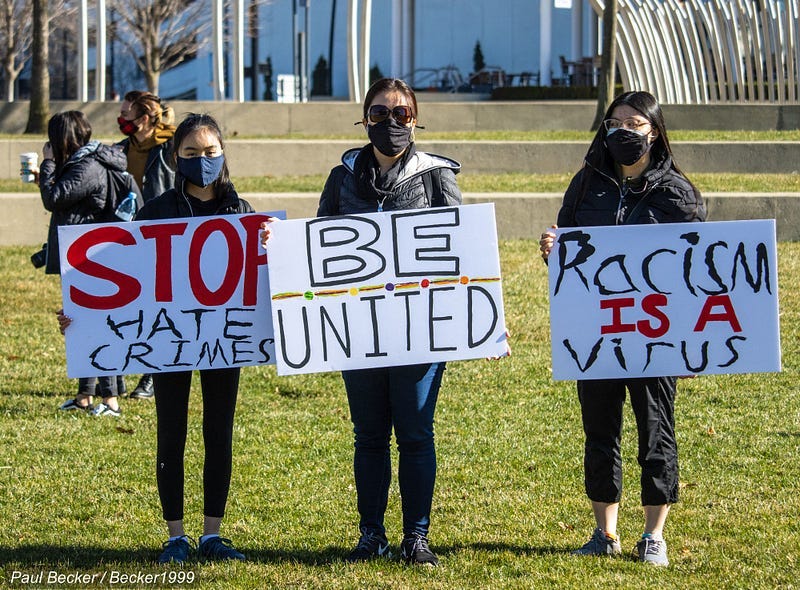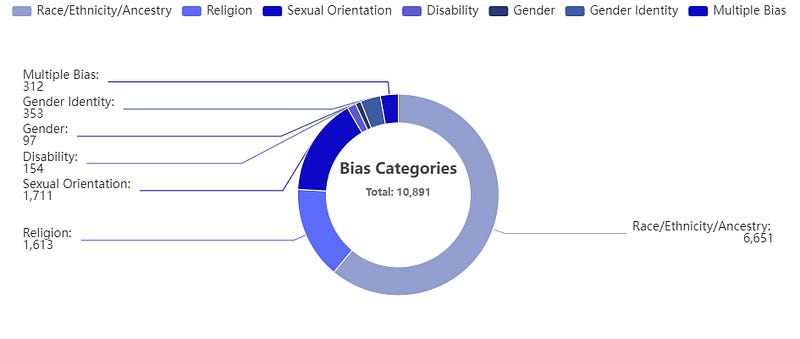Hate Crimes Against Black People Continues to Top List
While anti-Semitism and Islamophobia have seen spikes since the latest Israel-Palestine war, hate crimes against Black people continue to disproportionately top the list

The most recent hate crime data shown on the Federal Bureau of Investigation (FBI) Crime Data Explorer shows yet another spike in hate crimes against Black people over every other category — remaining the top hate crime committed. Hate Crime statistics for the nation are calculated based on data from 14,660 out of the 18,888 participating law enforcement agencies in the United States.
“The FBI Uniform Crime Reporting Program defines hate crime as a committed criminal offense which is motivated, in whole or in part, by the offender’s bias(es) against a race, religion, disability, sexual orientation, ethnicity, gender, or gender identity,” reads the FBI’s Crime Data Explorer website.
Over 61% of all hate crimes in 2021 were committed against people because of their race compared to over 63% in 2020 and over 54% in 2019. After a noticeable dip in 2019, the numbers have risen and remain above all other groups. Hate crimes against religious affiliation came in second at nearly 15% in 2021 compared to a staggering 21% in 2019.
As the problem grows, it’s hard not to notice that Islamophobia and anti-Semitism have spiked dramatically since the start of Israel’s war against Palestinians in Gaza and the West Bank. Anti-Semitic hate crimes hovered in fourth place in 2021 at about 8% of all hate crimes and jumped to second place at 10% of hate crimes in 2022, according to the FBI.
“Hate crimes are motivated, in whole or in part, by the offender’s bias against a race, gender, gender identity, religion, disability, sexual orientation, or ethnicity, and were committed against people, property, or society,” the FBI Crime Data Explorer website says about how agencies report hate crimes. “Because motivation is subjective, it is sometimes difficult to know with certainty whether a crime resulted from the offender’s bias.
In 2021, the U.S. saw 3,297 hate crimes against Black people compared to 3,424 in 2022 while 1,124 anti-Jewish hate crimes were committed and 738 committed against Latinos in 2022. As has been noted before, the data the FBI provides is incomplete due to the lack of accurate reporting by local and state police departments and the nearly 4,000 agencies that don’t participate in the voluntary Universal Crime Reporting program.
Some estimates suggest underreporting by as much as 50% due to more than 20% of police departments not participating, including some of the nation’s largest. The dangers of incomplete statistics often create misleading perceptions that adversely affect various historically oppressed groups. This is particularly important to avoid playing what is referred to as the “Oppression Olympics,” the practice of arguing how one group suffers more than others.
Another issue that often exposes the subjective nature of these crimes lies in the responding police officer’s implicit biases alongside those of district attorneys, prosecutors, and judges who often don’t provide adequate charges. Therefore, the data should be solely used to address the problem of hate crimes in totality and not to argue among groups that are targeted by bigots.
“The presence of bias alone does not necessarily mean that a crime can be considered a hate crime. Only when a law enforcement investigation reveals sufficient evidence to lead a reasonable and prudent person to conclude that the offender’s actions were motivated, in whole or in part, by their bias, should an agency report an incident as a hate crime,” the FBI’s Crime Data Explorer website continues.
As the nation becomes more polarized due to culture wars perpetrated by far-right actors along with the divide created between those with more inhumane thinking and others who keep human rights at the forefront, it’s clear that the problem of bigotry-driven crimes only seems to be getting worse. The increase in xenophobia directed at Latinos and the uptick in Islamophobia and anti-Semitism alongside the spike in anti-Black hate crimes shows that the growing problem is far from being properly addressed.
Now is the time to be vigilant and protect one another.
I am a freelance writer, journalist, and publisher of The Antagonist Magazine and a regular contributor at Latino Rebels and Unicorn Riot. You can find me on Twitter, Facebook, Instagram, Mastodon, and Threads.







How does the increased black hate relate to housing access, availability, and affordability? Also why are sexual orientation and gender identity separated, or split within a category?